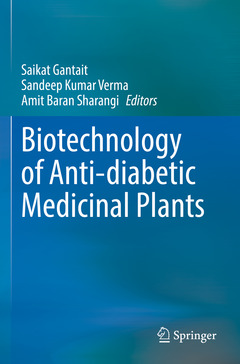Description
Biotechnology of Anti-diabetic Medicinal Plants, 1st ed. 2021
Coordinators: Gantait Saikat, Verma Sandeep Kumar, Sharangi Amit Baran
Language: English
Subjects for Biotechnology of Anti-diabetic Medicinal Plants:
Publication date: 11-2022
469 p. · 15.5x23.5 cm · Paperback
Publication date: 11-2021
Support: Print on demand
Description
/li>Contents
/li>Biography
/li>Comment
/li>
This book is a unique overview of insights on the genetic basis of anti-diabetic activity, chemistry, physiology, biotechnology, mode-of-action, as well as cellular mechanisms of anti-diabetic secondary metabolites from medicinal plants. The World Health Organization estimated that 80% of the populations of developing countries rely on traditional medicines, mostly plant drugs, for their primary health care needs. There is an increasing demand for medicinal plants having anti-diabetic potential in both developing and developed countries. The expanding trade in medicinal plants has serious implications on the survival of several plant species, with many under threat to become extinct. This book describes various approaches to conserve these genetic resources. It discusses the whole spectrum of biotechnological tools from micro-propagation for large-scale multiplication, cell-culture techniques to the biosynthesis and enhancement of pharmaceutical compounds in the plants. It also discusses the genetic transformation as well as short- to long-term conservation of plant genetic resources via synthetic seed production and cryopreservation, respectively. The book is enriched with expert contributions from across the globe.
This reference book is useful for researchers in the pharmaceutical and biotechnological industries, medicinal chemists, biochemists, botanists, molecular biologists, academicians, students as well as diabetic patients, traditional medicine practitioners, scientists in medicinal and aromatic plants, Ayurveda, Siddha, Unani and other traditional medical practitioners.
Dr. Saikat Gantait is an Assistant Professor in Genetics & Plant Breeding, as well as a Plant Breeder in Crop Research Unit, Directorate of Research, Bidhan Chandra Krishi Viswavidyalaya (BCKV) (State Agricultural University). Following completion of his PhD in Biotechnology from BCKV, he gained advanced research experience leading a group to conduct fruitful research during working as Research Associate in DBT (Govt. of India)-funded project, followed by working as a Post-Doctoral Researcher in Universiti Putra Malaysia. He has guided/co-guided multiple MSc and PhD students. His 14-year research works, so far, include molecular markers, plant tissue culture, polyploidy-induction, short-term (encapsulation/synthetic seed) and long-term (cryopreservation) conservation of medicinal and ornamental plant germplasms. In addition, he is acting as a Section Editor (Plant Biotechnology) of 3Biotech and Consulting Editor of Sugar Tech (journals from Springer Nature). Dr. Gantait has reviewed more than 130 manuscripts as an ad-hoc reviewer in 50 different eminent journals from Springer, Elsevier, Taylor and Francis, PLoS, Wiley etc. Dr. Gantait was awarded with Post-Doc fellowship from MOHE, Malaysia and successfully 2-year of advanced training at University Putra Malaysia on plant tissue culture and germplasm conservation. Till date, Dr. Gantait has published 120 articles/chapters in peer-reviewed journals and books (with cumulative SCI Impact Factor of 135), mostly as the first/senior author.
Dr. Sandeep Kumar Verma is an Associate Professor in Institute of Biological Science, SAGE University, Indore, India. He has more than 14 years of research and teaching experience in the field of biotechnology in India, Italy, South Korea, Turkey. He has 52 publications including peer-reviewed papers in SCI journals, book chapters and books. He is a recognized expert in the use of biotechnology, molecular biology, and nanotechnology techniques, giving many invit
Provides an overview of medicinal plants, secondary metabolites and their anti-diabetic activities
Discusses ways to conserve these genetic resources through micro-propagation, synthetic seed production, cryopreservation and other approaches
Describes enhancement of secondary metabolites and bioactive compounds through cell suspension culture, genetic transformation and elicitor intervention of different anti-diabetic plants




